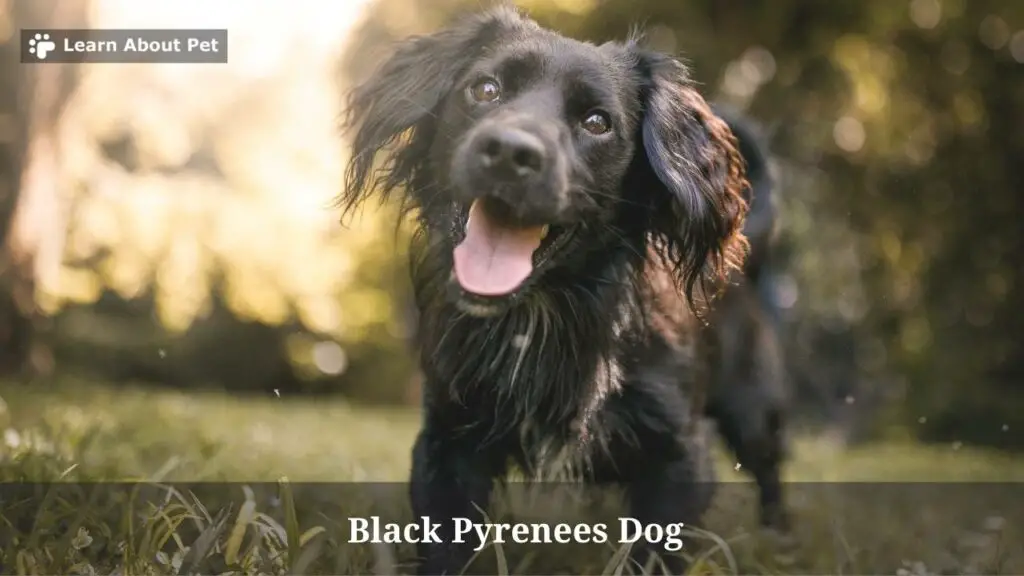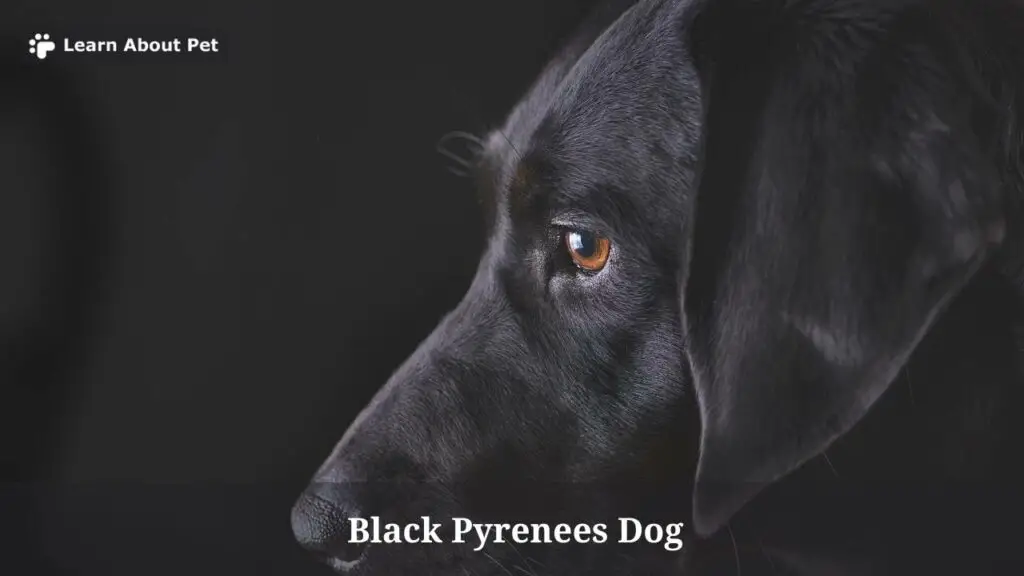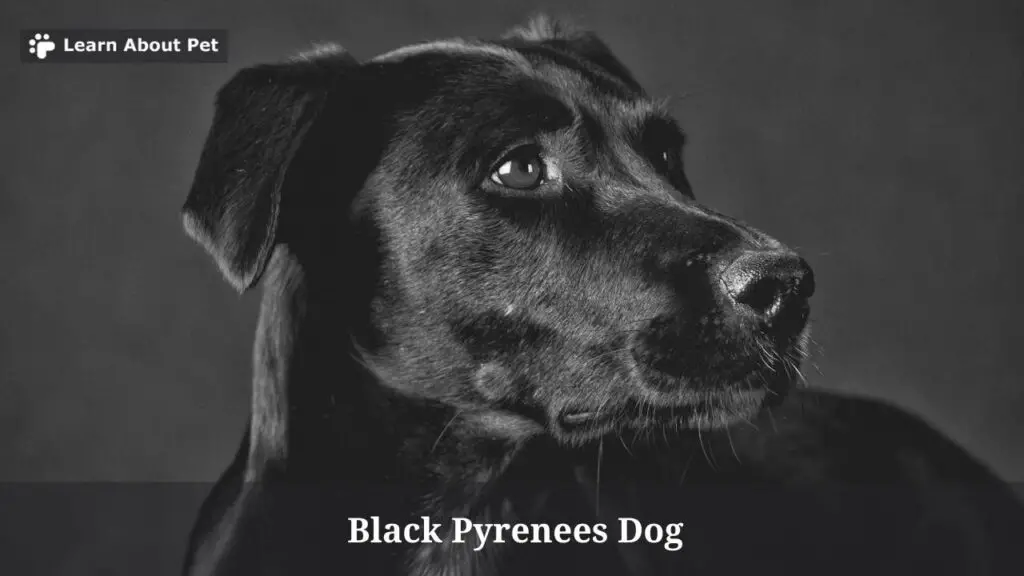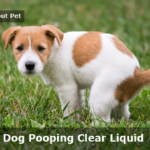The Great Pyrenees dog is undoubtedly one of the biggest, most powerful, and independent dogs. But can Great Pyrenees dogs be black? And if yes, what is the appearance, temperament and care needs like for a Pyrenees dog that is black? How can it be acquired? This article has the answers.
It is possible to find a partially black Pyrenees dog: one whose coat is predominantly white, but with a black patch (or several black patches). However, a Pyrenees dog that is solid black wouldn’t conform to breed standards.
The breed standard for the Great Pyrenees dog doesn’t allow for dogs whose coats are entirely black.
Nonetheless, there are people who say that Great Pyrenees dogs that are entirely black exist. Only that such dogs aren’t recognized under the AKC standard.

Thus adhering strictly to the breed standard, what would make a Pyrenees dog black is the presence of a black patch, or several black patches, against a predominantly white coat.
That is what, strictly speaking, would make a Great Pyrenees dog black.
So what we end up with then is a black and white Pyrenees dog. Such a black and white Great Pyrenees dog may meet the breed standard: if its coat is predominantly white, with a black patch or several black patches.
To be clear, this is not to say that you can never find a solid black Great Pyrenees dog. If you search online, you may find plenty of solid black Pyrenees mountain dog photos.
The only challenge that such a black Pyrenean mountain dog would face is pertaining to kennel club (like AKC) recognition.
But if you don’t care about Kennel Club recognition and such issues, then there are lots of partially or solid black Pyrenees dogs.
What Colors Can Great Pyrenees Be?
The Great Pyrenees is generally a white dog.
Thus going by breed standards, the Great Pyrenees is expected to be either wholly or partially (but still substantially) white.
Nonetheless, against the predominantly white coat, there can be patches in other colors.
Due to those patches, you may find a Pyrenees mountain dog black and white in color.
A single big black patch may make a Pyrenees dog black and white – in terms of appearance. But you can also find cases in which the black patches are more than one.
Other than black, the patches on a Great Pyrenees can be gray. Or they can be in what we refer to as ‘badger’ color: which is a reference to hairs that are black, gray and brown – with a white background.
So, to reiterate, the Great Pyrenees dog is predominantly white. But it can have patches of other colors – including gray, black and ‘badger’.
Are There Black Great Pyrenees?
The question on whether Great Pyrenees dogs can be black is one that arouses some controversy.
There are people who believe that there are indeed Pyrenees dogs that are black in color. To this end, they cite the French standard, which apparently recognizes black Pyrenees dogs…
Then there are those who assert that Pyrenees dogs can’t be black in color. To this end, they cite the American standard: in which we see that the AKC wouldn’t recognize black Pyrenees dogs.
So, what is the true position? Can a Great Pyrenees dog be black in color?
It is certainly possible to find partially black Great Pyrenees dogs. These are Pyrenees dogs that are predominantly white, but with patches that are black.
In this case, what makes the Pyrenean mountain dog black is the presence of such black patches on its coat.
These dogs may be recognized by Kennel Clubs.
It may also be possible to find a solid black dog that looks like Great Pyrenees. Some will tell you that, in some cases, that is indeed a true Pyrenees dog.
Others will tell you that it may be a Pyrenees dog mix. For instance, a Newfoundland black Pyrenees dog mix may have that sort of appearance.
In all this, it is important to remember that the Kennel club standards are often arbitrary. Thus the people who set the standards may have chosen to arbitrarily overlook black as a possible color for Pyrenees dogs.
In the final analysis, there is agreement that, at the very least, there are partially black Great Pyrenees dogs.
How Does A Black Pyrenees Dog Look?
In terms of color, the partially black Pyrenees dogs will have a coat that is predominantly white, but with a black patch – or several black patches.
Usually, in a Pyrenees dog, the black patches will be on the head region.
If you opt to disregard AKC standards, you may even find a truly solid black Pyrenees mountain dog.
Regarding Black Great Pyrenees size, they – like all Pyrenees dogs – will usually be very large. Adult males may range in height from 28 to 32 inches. Females may range in height from 26 to 30 inches.
The ears of a Great Pyrenees dogs will usually not be upright. On the contrary, they lie flat on the dog’s head.
Talking of the dog’s head, this will usually be rather small, relative to the dog’s overall size.
The Pyrenees dog will always have a double coat. The hair around the neck will usually be thick, making the dog look as if it has some sort of ‘mane’.
At this point, one may ask, are black Great Pyrenees rare? And the answer is ‘yes’. The Great Pyrenees dog is by definition usually white. Therefore black ones are a rarity.
Indeed, there are times when you may not succeed in finding a black Great Pyrenees for sale.
And in case you find a true Great Pyrenees black puppy up for sale, the price may be quite high. There are two things that make the black Great Pyrenees price high. Firstly, the Great Pyrenees dog is, by itself, quite unique and expensive.
Add to that the rarity of black Pyrenees dogs in particular, and you see the reason for the higher price.
What Is The Black Great Pyrenees Temperament Like?
Great Pyrenees dogs – including the black ones in question here – tend to be very independent. That is the defining feature of their personality.
Towards people they are familiar with, Great Pyrenees dogs are calm and friendly. But towards people they are unfamiliar with, they tend to be very skeptical. That makes them potentially suitable for guard duties.
In terms of intelligence, Great Pyrenees dogs are regarded as having high IQ.
Another key thing to know about Pyrenees dogs, including the black ones under consideration, is that they are very protective. So they have strong protective instincts.
The independent nature of the Pyrenees dog can make it look as if it is egotistical. But in all other regards, it is generally a nice dog – especially when it becomes familiar with you.

Are Black Pyrenees Dogs Trainable?
Black Pyrenees dogs, just like all other Pyrenees dogs, are trainable. To be sure, they are not always very easily trainable. Their training requires patience. But it is doable.
What makes black Pyrenees dogs training challenging is the fact that they are rather independent-minded. Some describe them as being apparently egotistical dogs.
To someone trying to train the dog, this can come across as stubbornness.
Another (related) thing that makes Pyrenees dogs hard to train is the fact that they are not eager to please. Training dogs that are eager to please tends to be easier.
But for an independent dog that is not so eager to please, training can be a challenge.
Ultimately though, if you are patient, and you put in the necessary effort, you can be successful in training black Pyrenees dogs.
Training for black Great Pyrenees puppies tends to be easier if it is started early. As soon as the puppies are weaned, basic training should be initiated.
Further, you are more likely to succeed in training a black Pyrenees mountain dog puppy if you use positive reinforcement. That is what works best, when training these sorts of independent-minded dogs.
What Care Do Black Great Pyrenees Dogs Require?
In caring for a Great Pyrenees dog (black or otherwise), there are 5 key things to pay attention to. Those are nutrition, exercise, healthcare, grooming and accommodation.
With regard to nutrition, you need to ensure that the black Great Pyrenees dogs you keep get adequate food. This should also be food of decent quality, supplying all the nutrients they require.
These are big dogs. Naturally, they require considerably bigger quantities of food than smaller dogs. The feeding frequency may be the same as for a smaller dog. But the portions need to be bigger.
Turning to exercise, the Great Pyrenees dogs are high energy dogs, with need for lots of exercise. If you are using the black Pyrenees dogs in the field (as livestock guard dogs), they may get the exercise they need in the course of work.
But if you are keeping the black Pyrenees dogs as pets in a yard, you need to make exercise arrangements. There needs to be times when the dogs are taken out, and allowed to exercise for adequate periods of time.
Turning to healthcare, it is essential to ensure that your black Pyrenees dogs get all vaccinations they need punctually. It is also essential to arrange for regular check- ups by vets, so that any budding health issues are dealt with early.
As for accommodation, you need to provide your black Pyrenees dogs with comfortable living and sleeping quarters. Remember, improper or inadequate accommodation can lead to stress, which can in turn lower the dogs’ immunity.
As for grooming, remember that the Pyrenees is a double coat dog. So brushing and trimming has to be regular. Don’t overlook other grooming aspects such as nail trimming and teeth brushing either.
How Can You Acquire A Pyrenees Black Dog?
There are certain breeders who specialize in livestock guarding dogs, such as the Pyrenees dogs in question here.
If you want a Pyrenees black dog, the first step should be to contact such a breeder. Then enquire from them whether they have a Pyrenees black dog they can sell to you.
From the breeder, you may actually find a Pyrenees solid black dog. That is if you don’t care much about AKC conformations and so on.
Alternatively, you may find something like a Great Pyrenees black and white puppy, which somehow meets AKC standards.
Otherwise you can visit the dog rescue shelters, especially in regions where these sorts of dogs are kept/used. So these are areas in which many people keep Pyrenees dogs for livestock guarding and other purposes.
While going through the dog rescue shelters in such areas, you may encounter Pyrenees black dogs, which you can adopt.
Final Verdict – Black Pyrenees Dog
The Great Pyrenees dogs are usually white in color. It is, however, possible to find some that have black patches on their bodies. Thus it is possible to find partially black Pyrenees dogs (thanks to such patches).
It may even be possible to find a solid black Pyrenees dog: though kennel clubs like AKC don’t recognize such.
Nonetheless, if AKC conformation is not a priority to you, and you search hard enough, you can find a solid Pyrenees black dog.
In terms of temperance, the solid Pyrenees black dog will tend to be rather independent. It is also highly intelligent, friendly towards people it is familiar with, but skeptical of unfamiliar people.
Since it is a rather big canine, the Pyrenees black dog (just like any Great Pyrenees) requires firm training. And this has to start from the most formative age.
Being a rather big canine, the Pyrenees black dog also requires more food, and bigger accommodation space.

You may have a chance to purchase the Pyrenees black dog from breeders who specialize in breeding livestock guard dogs.
In dog rescue shelters based in places that Pyrenees dogs are often used for livestock guard (and other) duties, you may also find some black ones that are available for adoption.
Thus you can purchase or adopt the Pyrenees black dog you need.
As a pet lover, make sure to learn about pet more and give your pet dog a good and comfortable life!

Welcome to Learn About Pet. My name is Rajkumar Ravichandran and I love all pets, travel, and amazing food. I write about my passion and personal experience caring for multiple pets in this blog! ❤️
Post Disclaimer
DISCLAIMER: THIS BLOG OR WEBSITE, "Learn About Pet", DOES NOT PROVIDE YOU WITH MEDICAL ADVICE AND IS NOT A SUBSTITUTE FOR MEDICAL ADVICE. ALWAYS GET IN TOUCH WITH YOUR PERSONAL VETERINARIAN AND USE INFORMATION HERE AS GENERAL ADVICE.
The information, including but not limited to, text, graphics, images and other material contained on this website are for informational purposes only. No material on this site is intended to be a substitute for professional veterinary advice, food recommendation, diagnosis, or treatment. Always seek the advice of your veterinarian or other qualified health care provider with any questions you may have regarding a medical condition or for pet food related questions.







